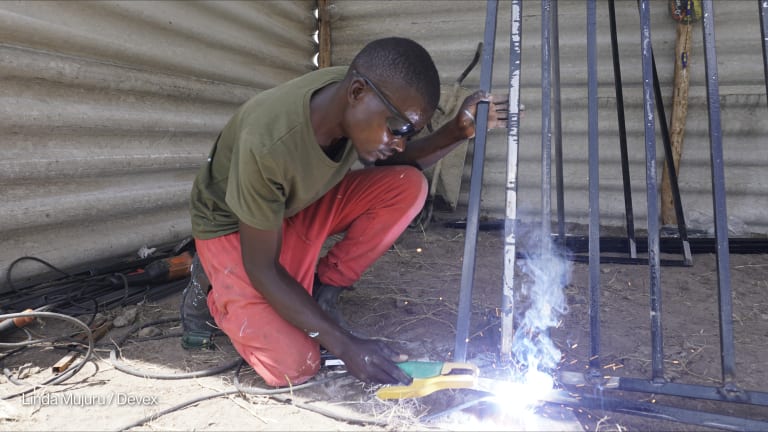
In 2004, 10 students in Hyderabad’s Muffakham Jah College of Engineering and Technology embarked on an initiative to help improve living standards in rural India. Today, more than 360 students and professional members across the country have joined their mission, bringing solar power and waste-to-energy projects to impoverished Indian villages.
In six years, Engineers Without Borders-India has established itself as a major volunteer organization in the country, attracting more students and professionals to sign up despite staffing and budget constraints.
“At any point of time, India has around 1.5 million engineering students. Even if five percent of them could be sensitized towards the problems we face today, I think we can bring in a whole lot of transformation,” said Amit Arora, EWB-India director.
Such growth shows the magnitude of interest that EWB has generated since its creation in 2002. Initiated by Bernard Amadei, a civil engineering professor at the University of Colorado at Boulder, EWB has spread across the globe. It now boasts some 12,000 student and professional volunteers in 250 chapters.
Open even to non-engineers, EWB offers members the chance to design appropriate technologies for basic services still missing in developing communities, especially potable water and sustainable energy sources.
Real-world challenges
“We’re kinda leaders in fostering [and] developing a new generation of engineers for the 21st century,” said Joshua Sperling, a volunteer with EWB-International.
“We want to create income for communities,” he added. “If you give a man a fish, he can eat for a day, but if you teach a man how to fish, he can eat for a lifetime. It’s that sort of approach that’s very critical to our work.”
Sperling helped establish EWB university chapters within and outside the U.S., including chapters in India.
Through reaching out to underserved communities, EWB seeks to foster a paradigm change from building expensive edifices to projects tailored to the needs of those marginalized in traditional infrastructure design.
“Engineering has to shift focus from grand infrastructure projects and supporting a consumer-oriented economy to the needs of 70 percent of [India’s] citizens having very little,” Arora said.
He acknowledged: “It’s unlikely that the focus will shift, but at least it could be broadened.”
EWB is open to university-based groups and professional organizations, extending membership even to non-engineers. Established organizations or startups may sign up as members.
Engineering firms, nonprofits, humanitarian organizations, universities and technical or vocational schools may also support EWB as partner organizations.
Sperling said the organization fills a void among young people concerned about global challenges.
“[These young people] engage in wanting to take action, finding solutions, just the kind of vision that Dr. Amadei has provided,” he said. “I think he’s provided a platform … It’s really about transforming our educational system, our curriculum in engineering.”
EWB and its international chapters send volunteer teams to remote parts of the world to partner with local organizations and implement projects on water supply and sanitation, electrification, housing and food production, among others. EWB chapters are now implementing hundreds of projects in developing nations across the globe.
Separate U.S .chapters, for instance, are building a water sanitation system in Kenya, a community center in Ecuador’s Amazon region, and a hydroelectric power system for rural villagers in India’s Orissa state.
“It’s an opportunity to apply what you learn in the classroom in a real-world environment, improving the lives of community member,” Sperling said. “You’re gaining international exposure, which I think is important for a lot of young people nowadays, to see what’s going on around them.”
Rising in India
Even while struggling to fund its activities, EWB has been attracting interest among engineering students across India.
“The interest we receive has been increasing, and we feel we are now at a stage that EWB-India would be growing at a faster pace than it ever has,” Arora said.
The organization now has student chapters in Hyderabad, Chennai, Nellore, Chandigarh, Indore and Coimbatore, and professional chapters in the cities of Mumbai and Bangalore.
Notable volunteer initiatives focus on cooking fuel briquettes made of waste materials, the solar electrification of a rural school, and a water supply and sanitation project for the Rasoolpura slum in Hyderabad.
Because many universities are unable to support campus-based chapters, EWB-India has relied largely on volunteers.
“This is due to the meager funds that EWB-India works with and that limits EWB-India in a big way,” Arora said. “This is sad because the opportunity and the potential of what Indian engineers can do is huge.”
The EWB-India Support Group, an assembly of India- and U.S.-based EWB volunteers, is working toward raising the organization’s $200,000 fund requirement in 2010.
“It would take an effort and funds to reach out to all these engineering students and create that awareness and consciousness,” Arora said, “but I think the tasks deserve the effort.”
Read more engineering stories:
Engineering Jobs in International Development: What You Need You Know
International Engineering Jobs: Opportunities and Challenges
Read more career advice articles.
Search for articles
Most Read
- 1
- 2
- 3
- 4
- 5








